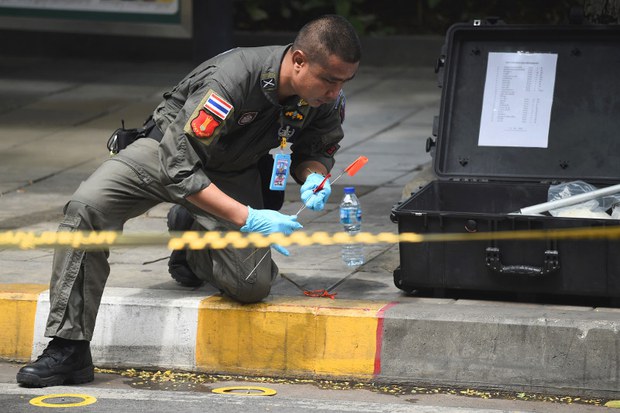Thai Security Officials: BRN Rebels Involved in Bangkok Blasts
2019.08.19
Bangkok and Pattani, Thailand
Updated at 4:30 p.m. ET on 2019-08-20
Thai officials knowledgeable on security matters in the country’s Deep South told BenarNews on Monday they believe the largest rebel fighting force in the insurgency-wracked region was behind recent bombings in Bangkok.
They claimed the bombings were aimed at drawing international attention to ongoing violence in the three Malay-speaking, majority-Muslim provinces near Thailand’s southern border, where more than 7,000 people have been killed in insurgency-related attacks in the past 15 years.
The comments came after a senior member of the National Revolutionary Front (BRN) told Reuters in a recent interview that the group was not involved in the blasts.
“I trust BRN operatives traveled to Bangkok to mount attacks in order to make news and draw foreign attention to intervene in Deep South violence. Lately, foreign countries do not pay attention to the ‘daily’ shootings or bombings,” a security source told BenarNews.
Many of the suspects have a record of links to the BRN, said the source, an intelligence officer based in the Deep South who spoke on condition of anonymity because he was not authorized to talk to reporters.
“I’m confident these attacks were carried out by the BRN operatives,” a senior military official told BenarNews, also speaking on condition of anonymity for the same reason.
He pointed to a spate of 11 bomb blasts in August 2016 in multiple locations in southern Thailand as evidence that rebels do not confine their activities to the Deep South.
“They scouted areas where they wanted to attack many months in advance before they attacked those provinces,” the official said.
The leader of a BRN combat unit later claimed responsibility for those attacks, which killed four. Four insurgents were found guilty that same year for bomb blasts that injured six people at a Bangkok university in 2013.
‘It is not true’
Nine small devices exploded at five locations around the Thai capital on Aug. 2 in what officials said was an attempt to disrupt a summit of the Association of Southeast Asian Nations (ASEAN) taking place in Bangkok. Four people suffered injuries that were not life-threatening.
Two suspects from the Deep South have been arrested in connection with the blasts, and arrest warrants have been issued for four other individuals with names characteristic of Deep South Muslims.
A spokeswoman for Prime Minister Prayuth Chan-o-Cha had earlier announced seven additional arrests, but officials clarified that those individuals were questioned and released.
In an interview with Reuters, a man identified as a senior BRN member said the group was not behind the Bangkok bombings.
“We will not attack beyond the three southernmost provinces because we do not want to be perceived as terrorists,” a man identified as Pak Fakir was quoted as saying. “We have our territory. Why should we venture out of it? ... Someone else must be behind it.”
The man also said BRN officials had met a Thai delegation “at a location in Southeast Asia” on Aug. 16, but Thailand’s peace talk chief, Gen. Udomchai Thammasarorat, flatly denied this.
“It is not true. We did not have such talk at all … In regard to Pak Fakir, the man who claims to be the a senior leader of BRN, I don’t know who he is and where he lives,” Udomchai told BenarNews.
Pak Fakir is a BRN member but not its spokesman, according to Abu Hafez Al-Hakim, a spokesman for a panel representing insurgent groups that has been engaged in desultory peace talks with the Thai government since 2015.
The demands reportedly voiced by Fakir on Friday – the release of all people detained over suspected links to the insurgency, and a transparent investigation into abuses by security forces – were among those presented to the Thai government in 2013, during a round of peace talks under the government of Yingluck Shinawatra.
“These demands were proposed to the Yingluck administration by the BRN, during the tenure of Hassan Toyib as the BRN’s peace-talks leader. They would have talked, if only the Thai government accepted those,” Abu Hafez told BenarNews on Monday.
Those talks ground to a halt in 2014, shortly before Yingluck’s government was overthrown in a military coup.
Questions have persisted as to whether the most militant elements in the decentralized BRN have ever signed on to the peace talks with the military government led by Prayuth, who is now Thailand’s elected prime minister. The peace talks have yet to formally resume since he was elected to the office in April.








